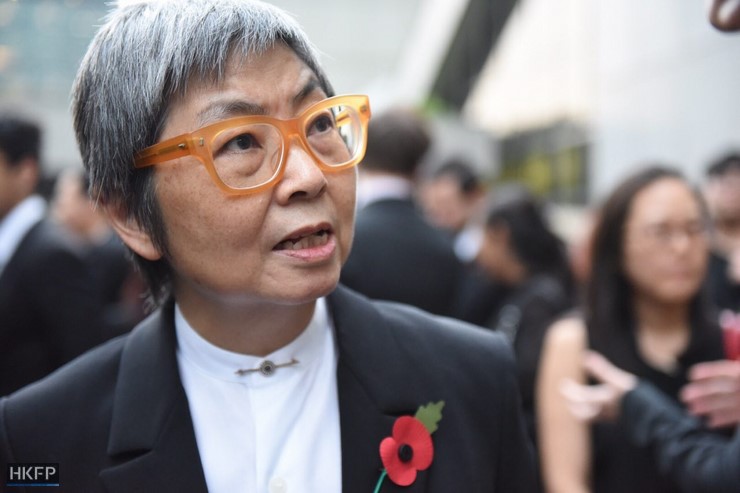The government has announced a controversial joint checkpoint arrangement for the HK$84.4 billion Guangzhou-Shenzhen-Hong Kong Express Rail Link, which involves “leasing” land to the mainland and effectively giving up Hong Kong jurisdiction in a quarter of the West Kowloon terminus.
The proposal sparked concerns over whether it will set a precedent for Hong Kong to lease more and more land to the mainland and create other zones where mainland officers will enforce mainland laws in Hong Kong.
Article 18 of Hong Kong’s Basic Law, the de facto constitution, stipulates that mainland laws cannot be implemented in the city, except for six national laws listed in Annex III.

Over the past two years, various cases sparked concerns that mainland agents were enforcing the law beyond the border. The most high-profile cases include those of Lee Bo, a British national who was apparently kidnapped from Hong Kong to the mainland; and Chinese businessman Xiao Jianhua, who was reportedly taken back to China for investigation from his residence in the luxurious Four Seasons Hotel in Hong Kong.
The joint checkpoint arrangement is not a new issue at all for Hong Kong. Since 2007, Hong Kong has leased an area at the Shenzhen Bay Port for the purposes of immigration control. The agreement lasts until June 30, 2047 – when the promise that Hong Kong can keep its “capitalist system and way of life” expires.
Soon after Hong Kong leased land from Shenzhen, lawmakers already envisioned a similar joint checkpoint arrangement implemented in Hong Kong.
In May 2008, pro-Beijing lawmaker Wong Ting-kwong tabled a non-binding motion at the Legislative Council urging the government to implement a joint checkpoint arrangement for the Express Rail Link and the Hong Kong International Airport.

Wong argued that the arrangement would “enhance the efficiency of passenger and freight transport to and from the mainland, consolidate the position of Hong Kong as a regional aviation and transportation hub and strengthen the competitiveness of Hong Kong.”
Another pro-Beijing lawmaker Jeffrey Lam also suggested that a similar arrangement be used for a road between the Hong Kong and Shenzhen airports, and for a cross-border helipad.
At the time, pro-democracy lawmaker Margaret Ng warned of the potential implications of the Shenzhen Bay lease.
“The Hong Kong side should only implement immigration laws there, and not all Hong Kong laws. If, in the future, there is a reverse case, where all mainland laws are applied in a [leased] port in Hong Kong, it will be a more serious violation of the Basic Law,” she said.

Alternative options
When the government requested funding for the Express Rail Link in 2009, it did not insist on having a joint checkpoint arrangement, as lawmakers questioned the feasibility of the idea at the time.
The then-transport secretary, Eva Cheng, said the government would not rule out compromises such as conducting immigration inspections on the train or at stations in the mainland. She said some mainland stations, namely Futian, Longhua, Humen and Guangzhou, had reserved space for such purposes.
The government often boasted the advantages of the Express Rail Link, saying that a direct train could reach Guangzhou in 48 minutes – much faster than current transport options.
But opposition lawmakers argued that the plan should be suspended. They said that if a joint checkpoint arrangement – which may violate the Basic Law – could not be implemented, the Express Rail Link would be useless in increasing efficiency for passengers, since they would have to disembark in Shenzhen for border checks.
However, their doubts were left unanswered. Despite opposition from the pro-democracy camp, funding for construction was passed at the Legislative Council. Afterwards, the government rarely disclosed details of its discussions with the mainland over what arrangement will be used.
In December 2015, then-chief executive Leung Chun-ying said that it was necessary for the Express Rail Link to adopt a joint checkpoint arrangement.

Legality
The current government proposal will go through a three-step process. First, the government will sign an agreement with the mainland on how to set up the designated mainland port area in the West Kowloon station.
Secondly, it will ask for approval and endorsement from the Standing Committee of the National People’s Congress (NPC), in accordance with Article 20 of the Basic Law. This allows Hong Kong to lease areas of the property to the mainland, according to the government. Article 20 stipulates that Hong Kong “may enjoy other powers” granted to it by the NPC, the Standing Committee or the central government.
The government also said that, according to Article 7, Hong Kong land belongs to the state, but Hong Kong is responsible for its management, use, development and lease.

Opposition lawmakers say the move would amount to asking the NPC to grant Hong Kong the power to give up jurisdiction over its land and set a bad precedent.
The final step is for Hong Kong to enact local laws to implement the arrangement.
Under the arrangement, the leased areas will no longer be legally regarded as part of Hong Kong. Thus, the agreement would not violate article 18, according to the government.
Lawmakers also questioned whether the power granted by the NPC using Article 20 could override Article 18, since the Legislative Council cannot enact laws that violate the Basic Law.

Since the announcement, legal challenges have been filed by those who think that the arrangement will violate the freedom of Hongkongers when they are in the mainland port area.
But legal scholar Eric Cheung said the challenges will likely be dismissed by the court, since the NPC has the power to interpret the law.
Pro-democracy heavyweight Martin Lee, a former member of the Basic Law drafting committee, even questioned whether such an arrangement to lease land from Hong Kong could be used to crush protests.
It is also unclear whether the mainland would pay to lease the property, or how much it would have to pay.

Paradigm shift
The government announced the joint checkpoint arrangement at a time of widespread concern about interference in Hong Kong’s autonomy and rule of law.
In the last year, localist candidates were barred from running in elections, six democratically elected lawmakers were disqualified by the court, and China claimed that the Sino-British Joint Declaration – on which the Basic Law was based, was a “historical document and does not have any practical significance.”
Renowned scholar and commentator Joseph Lian wrote in an article that there was a paradigm shift in protest culture after recent events, since China seemed to have lost its self-restraint.
“The public has realised that the Sino-British Joint Declaration has been scrapped, the ‘Two Systems’ has been structurally destroyed, the traditional social movement no longer has energy, democracy is a faraway goal, and participation is waste of time,” he wrote.
